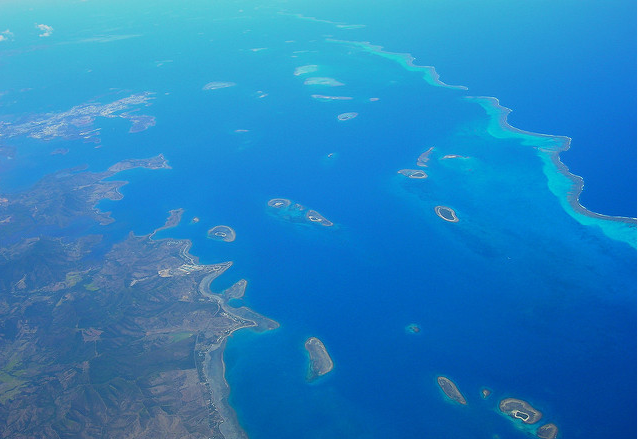Divisions and deadlines in New Caledonia
Posted By Denise Fisher on August 30, 2017 @ 12:30

New Caledonia is preparing to hold an independence referendum by the November 2018 deadline. The stakes are high, as the outcome could redefine France’s status in our region. All parties have a lot to do over a short time, in a volatile environment.
The French territory, Australia’s closest neighbour to Brisbane, has strategic significance. At a time when Chinese engagement, including in the South China Sea, can potentially alter our seaways and immediate neighbourhood, a stable ally at the western end of the South Pacific is an asset. New Caledonia was once known as the ‘US aircraft carrier’, headquarters for the Coral Sea victory that underpins the Australia–US alliance. Hydrocarbons are evident in our contiguous EEZs. Alone of the Melanesian countries arching to our northeast, New Caledonia has been stable for 30 years, under agreements now ending.
New Caledonia was regularly in the news in the 1970s and 1980s as its Kanaks fought for independence. It has gone off our radar since. Under regional and global pressure, France negotiated agreements culminating in the 1998 Noumea Accord [1], to finally deliver on its longstanding promise of an independence vote.
France and the main political forces in New Caledonia, loosely divided into pro-France and pro-independence, have worked hard to implement the accord. New institutions include three provincial governments, a territory-wide Congress, and a Customary Senate. Scheduled handovers of responsibilities have generally been met, albeit with major shortfalls and ambiguities, including in state media, education, and the critical minerals sector.
New Caledonia has more than 25% of the world’s nickel, and the accord was underpinned by an agreement to redistribute nickel revenues [2]. It was the territory’s plans to invite foreign involvement in mining that hardened France’s resistance to independence in the 1960s. France has generally fulfilled its commitments, providing fiscal support for massive investment worth over US$2 billion in each of two new plants, one in the mainly European south and the other in the Kanak north. But both are plagued with financial and technical problems, neither produces to capacity, and nickel prices have plunged.
Political instabilities abound. There’s a tension between France’s role as organiser and arbiter of the referendum, and the openly stated desire of its successive presidents, including Emmanuel Macron, for New Caledonia to remain French. Macron has added a potentially conciliatory qualifier, suggesting that it remain part of the ‘national community’.
The government, or Cabinet, was designed to be collegial, reflecting proportionate strengths in the Congress. But, over time, Cabinet votes have inevitably reflected the majority loyalist position, reviving pro-independence fears of not being heard which date from the 1970s when France shipped in outsiders to outnumber them [3]. Those fears underlay the accord’s restriction of voting in local elections to those with 10 years of residence to 1998. In turn, loyalists are worried about the weakening of their position over the four elections since 1999. They went from holding 36 of the 54 Congress seats in 2004 to 29 in 2014, and independence groups increased from 18 to 25.
The referendum’s outcome is unpredictable. The composition of the electorate will be critical. The accord stipulates that only those with 20 years of residence to 2014 can vote, meaning more pro-France newcomers than for local elections. But first-time Kanak voters could have a pro-independence effect, though that’s difficult to gauge as France removed and then altered the census’s ethnic category from 2003. Both sides question the voter list [4], and UN advisers have been involved.
Instabilities arise too from divisions within both groups. Loyalist divisions are arguably more destabilising than divisions on the pro-independence side, since the latter, mainly Kanaks, tend to the Pacific tradition of eventually seeking consensus. Loyalists recently closed ranks in a new coalition during French legislative elections. But they have done so before, only to fall apart.
Each side has different views about the referendum itself. Again, loyalists are more divided, variously favouring no vote at all, or only one vote when the accord provides for up to three, or a vote and then discussion about what is to follow, or the reverse. Macron has framed the referendum question as yes or no to full sovereignty. [5] The accord also requires a focus on international status, remaining sovereign powers, and preservation of the rights of longstanding residents.
A process of collaborating on areas of convergence and divergence [6] organised by France has been obstructed by loyalists claiming nothing can be done until after French national elections, including senatorials in September 2017. Yet the focus is at its most demanding and sensitive on the areas of divergence, the very subjects that led to bloodshed in the 1980s: international status, immigration and mining. To cap it off, ongoing violence involves young Kanaks targeting middle-class Europeans [7]. Such activity has traditionally been manipulated by both sides.
Divisions will be next tested in September, when the local Cabinet has to re-form after a vacancy arising from French assembly elections. And again when the committee of accord signatories meets, in October, just 13 months before the referendum.
Article printed from The Strategist: https://www.aspistrategist.org.au
URL to article: https://www.aspistrategist.org.au/divisions-deadlines-new-caledonia/
URLs in this post:
[1] the 1998 Noumea Accord: https://www.legifrance.gouv.fr/affichTexte.do?cidTexte=JORFTEXT000000555817
[2] an agreement to redistribute nickel revenues: http://www.liberation.fr/futurs/2005/11/28/l-accord-de-bercy-de-1998_539923
[3] when France shipped in outsiders to outnumber them: http://www.ldh-toulon.net/Nouvelle-Caledonie-le-reve-de.html
[4] question the voter list: http://m.la1ere.francetvinfo.fr/nouvellecaledonie/sites/regions_outremer/files/assets/documents/08.06.2016-rapport_lesp-fin_0.pdf
[5] Macron has framed the referendum question as yes or no to full sovereignty.: https://www.lowyinstitute.org/the-interpreter/french-presidential-election-implications-australia-s-closest-french-neighbour
[6] collaborating on areas of convergence and divergence: https://www.lowyinstitute.org/the-interpreter/new-caledonia-prepares-future-two-steps-forward-one-step-back
[7] young Kanaks targeting middle-class Europeans: http://www.lemonde.fr/societe/article/2017/02/13/en-nouvelle-caledonie-l-escalade-de-violence-menace-la-paix_5078845_3224.html
Click here to print.